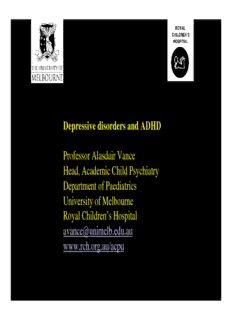
Professor Alasdair Vance PDF
Preview Professor Alasdair Vance
Depressive disorders and ADHD Professor Alasdair Vance Head, Academic Child Psychiatry Department of Paediatrics University of Melbourne Royal Children’s Hospital [email protected] www.rch.org.au/acpu Outline 1. Early onset depressive disorders: definition 2. Key risk factor of inattention for early onset depressive disorders 3. Implications for assessment and treatment 1. Diagnosis-some comments: DSM-IV definition of a mental disorder- a clinically significant behavioural or psychological syndrome or pattern that occurs in an individual and is associated with present distress or disability (impairment in one or more areas of functioning) or significantly increased risk of suffering, death, pain or disability or an important loss of freedom 1. Diagnosis-some comments in children and adolescents- clinically significant, that is developmentally inappropriate, pattern of symptoms has to be associated with clinically significant impairment in social, academic, occupational or other important areas of functioning clinically significant impairment has to be judged relative to children of the same age, gender and IQ 1. Diagnosis-some comments within a developmental context symptom patterns and associated impairment in social, academic, occupational or other important areas of functioning need to be monitored longitudinally so the clinician can accurately assess the child [1] within their current developmental phase and [2] across developmental phases as each child develops 1. Diagnosis-some comments multi-informant report: category and dimension parent, teacher child low agreement rate repeatedly shown varys between externalising and internalising disorders externalising: parent-teacher: increased agreement internalising: child-teacher: increased agreement 1. Diagnosis- some comments a dimensional description of symptoms used to make a diagnosis can provide additional evidence that the symptoms are indeed in the clinical range normally distributed dimension: mean, median, mode-equal within 1 standard deviation: 68% values lie within 1.5 standard deviations: 81.8% values within 2 standard deviations: 95.5% values lie within 3 standard deviations: 99.7% values lie 1. Diagnosis – some comments characteristics of individuals and groups of individuals at the extremes of a normal distribution essentially differ from those individuals that lie closer to the mean brain behaves differently environment behave differently Major depressive disorder – one or more major depressive episode(s) characterized by the following: period of two weeks or more -depressed and/or irritable mood predominant and/or -loss of interest or pleasure -3 or 4 or more of the following; feelings of worthlessness or excessive or inappropriate guilt, >5% weight change in a given month, in/hyper somnia, psychomotor agitation/retardation, anergia (fatigue), decreased concentration or ability to think or decisiveness, recurrent thoughts of death, suicidal ideation, suicide plan or suicide attempt symptoms cause impairment in interpersonal, social, academic, occupational functioning not due to a substance, medical condition or bereavement
Description: